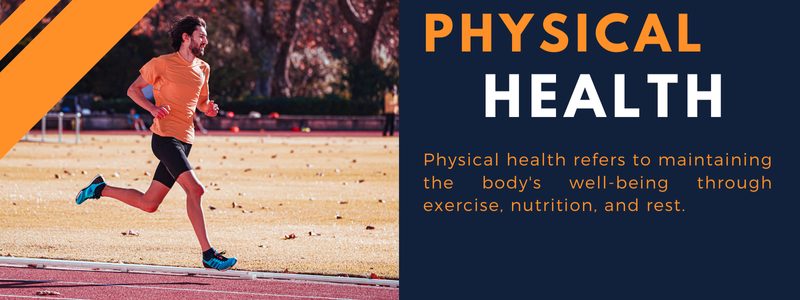
Table of Contents
Introduction
When we think about health, the first thing that usually comes to mind is physical well-being. Physical health is the foundation upon which all other aspects of our lives—emotional, mental, and social—are built. Without a healthy body, it’s hard to focus, be productive, and maintain a positive mindset.
In this blog, we’ll explore the importance of physical health, its key components, and actionable steps to develop a healthy lifestyle. Let’s dive into how you can take control of your body and, consequently, your life.
Why Physical Health is So Important
Your physical health doesn’t just affect how you look or feel today—it impacts your long-term quality of life. Maintaining a healthy body allows you to avoid chronic diseases, recover faster from illnesses, and perform daily tasks with ease. But physical health isn’t just about preventing illnesses; it’s about thriving and living a more energetic, vibrant life.
Good physical health influences everything from your immune system to your mental clarity, making it a non-negotiable for anyone aiming to live life to the fullest.
Key Components of Physical Health
To maintain physical health, it’s essential to focus on several key areas that work together to support the body. Here are the most important components:
1. Regular Exercise
Physical activity is the cornerstone of physical health. Engaging in regular exercise not only keeps your muscles strong but also supports cardiovascular health, boosts metabolism, and even enhances mental well-being.
Whether it’s walking, swimming, weightlifting, or practicing yoga, consistent movement is necessary. The World Health Organization recommends at least 150 minutes of moderate aerobic activity or 75 minutes of vigorous activity per week. However, the best exercise is one you enjoy and can stick to.
2. Balanced Nutrition
You are what you eat. Your diet plays a vital role in maintaining your physical health, as food is the fuel your body needs to function. Eating a balanced diet means consuming a variety of nutrients from different food groups—protein, carbohydrates, fats, vitamins, and minerals.
Here are some basic principles for balanced nutrition:
- Eat plenty of fruits and vegetables.
- Incorporate lean protein sources like chicken, fish, and legumes.
- Choose whole grains over processed foods.
- Limit sugar, salt, and unhealthy fats.
A well-balanced diet can provide the energy and nutrients needed to support all body functions and prevent malnutrition and chronic diseases.
3. Sleep and Recovery
Your body needs rest to repair and rejuvenate itself. Sleep is crucial for physical health because it allows for recovery after daily activities, reduces inflammation, and improves immune function.
Adults should aim for 7-9 hours of quality sleep per night. Sleep deprivation not only affects your mood but can also lead to more severe health issues like heart disease, obesity, and diabetes.
4. Mental Well-being
Physical health is deeply intertwined with mental health. Chronic stress, anxiety, and depression can take a toll on your body, weakening your immune system and increasing the risk of illnesses. Practices like mindfulness, meditation, and even regular exercise can improve mental well-being.
Taking care of your mental health should be viewed as an integral part of your overall physical health. The mind-body connection is powerful, and positive mental health supports physical vitality.
The Benefits of Maintaining Physical Health
The benefits of good physical health extend beyond just looking good. Here’s why investing in your physical well-being is essential:
1. Enhanced Immunity
A strong immune system is your body’s defense against infections and diseases. Regular exercise, good nutrition, and adequate sleep all contribute to improved immune function, helping you fight off illnesses more effectively.
2. Better Mood and Mental Clarity
Exercise triggers the release of endorphins—also known as the “feel-good” hormones. These not only improve mood but also reduce symptoms of anxiety and depression. Proper nutrition fuels your brain, ensuring better concentration, memory, and problem-solving skills.
3. Longevity and Disease Prevention
Maintaining physical health helps prevent various chronic diseases like heart disease, diabetes, and some cancers. A well-rounded lifestyle, focusing on exercise and diet, can add years to your life and ensure those years are lived with vitality.
How to Develop and Maintain Physical Health
Maintaining physical health is a lifelong journey, but it doesn’t have to be complicated. Here’s how you can develop and sustain healthy habits:
1. Set Realistic Goals
Start by setting specific, achievable goals. Whether it’s walking 30 minutes a day or reducing processed foods in your diet, small, manageable steps are more sustainable. Over time, they build up to significant improvements.
2. Incorporate Physical Activity in Daily Life
You don’t have to hit the gym every day to stay fit. Incorporate movement into your daily routine—take the stairs, go for a walk during your lunch break, or try stretching exercises at home. Finding opportunities for movement throughout the day adds up.
3. Maintain a Sustainable Diet
It’s important to find a diet that works for you. Instead of following extreme diets, focus on eating whole, unprocessed foods most of the time. A flexible, enjoyable approach to eating is key to maintaining physical health in the long run.
4. Prioritize Sleep and Stress Management
Make sleep a priority by creating a restful bedtime routine. Limit screen time, reduce caffeine, and manage stress through mindfulness practices like yoga or meditation. These habits will help you stay well-rested and resilient in the face of daily challenges.
Conclusion
Physical health is the bedrock of a vibrant and fulfilling life. By focusing on regular exercise, balanced nutrition, proper sleep, and mental well-being, you create a body that can handle whatever life throws your way. The benefits of good physical health aren’t just immediate; they build up over time, ensuring that you live longer, healthier, and happier.
Make small changes today that lead to big results tomorrow. Your body will thank you for it.
